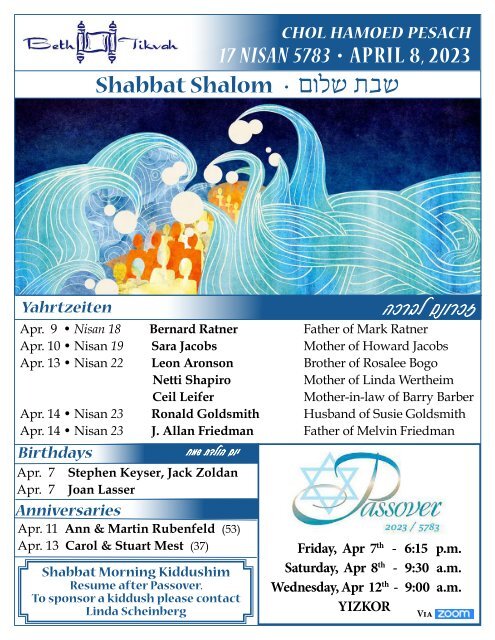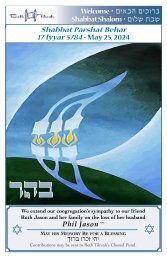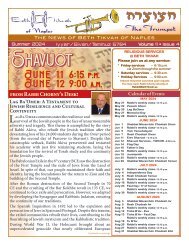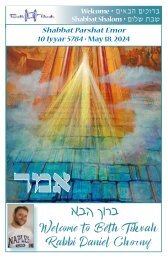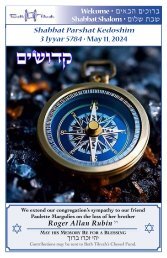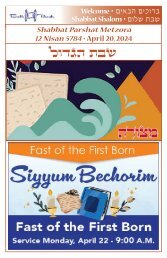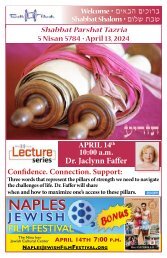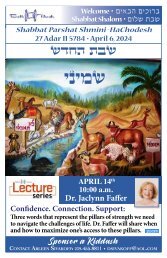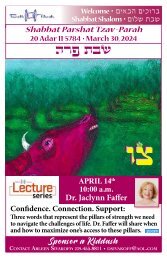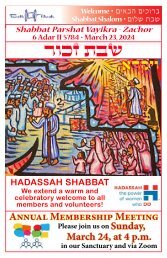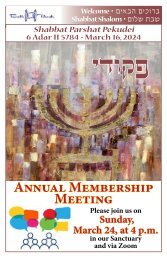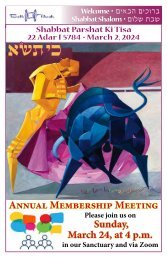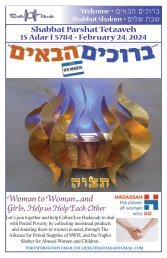Shabbat Chol
Create successful ePaper yourself
Turn your PDF publications into a flip-book with our unique Google optimized e-Paper software.
CHOL HAMOED PESACH<br />
17 NISAN 5783 • APRIL 8, 2023<br />
<strong>Shabbat</strong> Shalom • ouka ,ca<br />
Yahrtzeiten<br />
<strong>Shabbat</strong> Morning Kiddushim<br />
Resume after Passover.<br />
To sponsor a kiddush please contact<br />
Linda Scheinberg<br />
vfrck oburfz<br />
Apr. 9 • Nisan 18 Bernard Ratner Father of Mark Ratner<br />
Apr. 10 • Nisan 19 Sara Jacobs Mother of Howard Jacobs<br />
Apr. 13 • Nisan 22 Leon Aronson Brother of Rosalee Bogo<br />
Netti Shapiro<br />
Mother of Linda Wertheim<br />
Ceil Leifer<br />
Mother-in-law of Barry Barber<br />
Apr. 14 • Nisan 23 Ronald Goldsmith Husband of Susie Goldsmith<br />
Apr. 14 • Nisan 23 J. Allan Friedman Father of Melvin Friedman<br />
Birthdays<br />
Apr. 7 Stephen Keyser, Jack Zoldan<br />
Apr. 7 Joan Lasser<br />
Anniversaries<br />
jna `skuv ouh<br />
Apr. 11 Ann & Martin Rubenfeld (53)<br />
Apr. 13 Carol & Stuart Mest (37)<br />
Friday, Apr 7 th - 6:15 p.m.<br />
Saturday, Apr 8 th - 9:30 a.m.<br />
Wednesday, Apr 12 th - 9:00 a.m.<br />
YIZKOR<br />
Via
Torah & Haftarah Readings:<br />
Devarim: Exodus 33:12-34:26 (Etz Hayim p. 538)<br />
1. 33:12-16 2. 33:17-19 3. 33:20-23 4. 34:1-3<br />
5. 34:4-10 6. 34:11-17 7. 34:18-26 M. Numb.28:19-25 ( p. 932)<br />
Haftarah: Ezekiel 37:1-14 (Etz Hayim p. 1308)<br />
Torah Summary<br />
Meeting the Gaze of Moses<br />
Bex Stern-Rosenblatt<br />
This week, on <strong>Shabbat</strong> <strong>Chol</strong> HaMoed Pesach, we once again have the<br />
opportunity to read the beautiful and borderline irreverent passage in<br />
which Moses asks to see God’s kavod, God’s presence or glory. The leadup<br />
to Moses’s big ask is exquisite - Moses and God dance around the topic,<br />
one more polite than the next, as they reconfigure their relationship in the<br />
wake of the Golden Calf.<br />
The words both Moses and God use focus on sight. Moses starts his<br />
speech by asking God to “see,” to “look.” He’ll remind God to “see” that<br />
this people, Israel, is God’s nation. Repeatedly, Moses reminds God that<br />
God likes Moses, literally that Moses has “found favor in his eyes.” This<br />
emphasis on sight is striking. Rashi explains that Moses is reminding God<br />
to look back to God’s own words, to reflect that to which God has already<br />
acquiesced. Ibn Ezra reads “see” as Moses asking God to look at him, to<br />
behold the difficult situation in which Moses finds himself. Either way, the<br />
request to be seen is a call for remembering and for taking responsibility.<br />
God agrees to the request of Moses, explaining that God’s face, perhaps<br />
meaning God’s presence, will go with the Israelites. Moses had two<br />
requests, for God to see and to let him know who would lead the Israelites<br />
with him. God responds definitively to the latter request. God perhaps<br />
also responds to the first request, the call for sight, by sending his seeing<br />
mechanism to be with Moses. God puts God’s face at eye level with the<br />
Israelites, becoming their perpetual beholder.<br />
All this talk of God seeing Israel, of God bringing God’s face to Israel,<br />
contextualizes God’s response when Moses famously requests to see<br />
God’s kavod. Setting up an aspects-of-God parade, God will allow various<br />
attributes of God to pass before Moses’s face while Moses is wedged in a<br />
rock. But God will not allow Moses to see God’s kavod or God’s face. The<br />
relationship defined here is clear and asymmetrical. God is present, God’s<br />
face is present with the Israelites, so that God can see them and can behold<br />
Moses. But Moses is not to see God’s face.<br />
But Moses does glimpse something. We read that God permits Moses to<br />
see God’s ahor. Many modern translations render this word as “back.”<br />
Moses catches a view of God as God leaves. It is unclear what God’s back<br />
is supposed to be or why Moses would be allowed to look at it. One<br />
possibility, brought to us by Rashi, is that God shows Moses the knot of<br />
tefillin behind his head. However, “back” is not the only way the word has<br />
been understood. Targum Onkelos, a second century Aramaic version of<br />
the Torah, renders ahor and penai, which I have been translating as “face,”<br />
as directional terms, reading the verse to say, “You will see that which is<br />
after me, but what is before me shall not be seen.” The Avot de Rabbi<br />
Natan understands these terms as references to the world to come and to<br />
this world. Moses may see one but not the other. Diana Lipton, a current<br />
biblical scholar at Tel Aviv University, suggests based on careful readings of<br />
rabbinic texts, that we may understand the ahor as referring to the future<br />
and penai as referring to the past. God permits Moses to glimpse the future<br />
but not the present and not the past. God reassures Moses by showing him<br />
the continuity of the Jewish people long after Moses is gone.<br />
God does not reveal to Moses the mysteries of how people work in his<br />
present time or why the Golden Calf happened. Rather, God lets Moses<br />
know that we will be ok even after Moses is gone. God fully sees Moses,<br />
answering the true question that Moses is asking.<br />
On Pesach, we do the opposite. We gaze deeply into our past, reliving the<br />
Exodus. In doing so, we see the penai rather than the ahor. In looking<br />
towards the past, we see God’s face, dwelling securely among the Jewish<br />
people.<br />
For more on the idea of ahor as the future, check out Diana Lipton’s article,<br />
“God’s back! What did Moses see on Sinai?.”<br />
Exodus: Greater the Second Time Around<br />
Vered Hollander-Goldfarb<br />
After two seder nights we get the idea: the greatest event of the Jewish<br />
people was the wondrous Exodus from Egypt, the land of bondage (not<br />
just for us). It set us on course for the rest of our existence always looking<br />
back to that formative experience which will color our narrative and our<br />
legal system. We left the land of bondage for us and the land of plenty (if<br />
you were an Egyptian master) and headed to the land of Israel to finally live<br />
in the land intended for our nation.<br />
Then came the exile. We were thrown out of the land. The Exodus from<br />
Egypt unraveled. We were no longer a free and independent people living<br />
in our own land. While prophets warned of the possibility of exile because<br />
of our behavior, the reality of such a possibility did not sink in. Does anyone<br />
really imagine being forced out of their home? That was not built into the<br />
narrative.<br />
It is in the setting of the community exiled to Babylon that Ezekiel speaks.<br />
Explaining the unsettling description of the dry bones scattered on the<br />
floor of a valley, Ezekiel says that the dry bones are the people of Israel.<br />
They describe themselves as dried bones, as people whose hope is lost.<br />
(The word for hope is “tikvah”. Naphtali Zvi Imber gave a modern reading<br />
of this chapter in his poem that would eventually be the basis for Hatikvah<br />
– Israel’s national anthem.) Ezekiel promises this dispirited group that God<br />
will take them out of their graves and bring them to the land of Israel.<br />
Whether this is intended figuratively or literally is debated.<br />
This explains the need for Ezekiel’s prophecy, but not the choice to read<br />
this prophecy as the haftarah on <strong>Shabbat</strong> <strong>Chol</strong> Hamoed Pesach. It might<br />
have to do with the message of Pesach itself. We have spent a great deal<br />
of time telling the story of the Exodus, our story of redemption. Now we<br />
face a problem. Anyone following the story will be able to point out that<br />
the redemption that we are touting failed in the end. We are not in the land<br />
promised to our ancestors but rather in another exile. Don’t we see how<br />
pointless it is to talk about our Exodus and our going to the land when we<br />
have been kicked out of it and returned to a status of sojourners in foreign<br />
lands?!<br />
The prophecy of Ezekiel has come to speak to every generation that<br />
found itself as dry bones at the bottom of a valley. It promised a future<br />
redemption more miraculous and amazing than even the exodus from<br />
Egypt, the ultimate measuring stick of the Tanakh. As we tell ourselves the<br />
great story of God taking us out of Egypt, Ezekiel has helped Jews through<br />
the centuries believe that it can happen again, just greater. We have not<br />
lost our hope.<br />
Beth Tikvah of Naples<br />
1459 Pine Ridge Road • Naples, FL 34109<br />
ph: 239 434-1818


